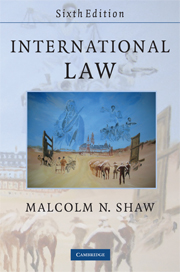Book contents
- Frontmatter
- Contents
- Preface
- Table of cases
- Table of treaties and selected other international instruments
- List of abbreviations
- 1 The nature and development of international law
- 2 International law today
- 3 Sources
- 4 International law and municipal law
- 5 The subjects of international law
- 6 The international protection of human rights
- 7 The regional protection of human rights
- 8 Individual criminal responsibility in international law
- 9 Recognition
- 10 Territory
- 11 The law of the sea
- 12 Jurisdiction
- 13 Immunities from jurisdiction
- 14 State responsibility
- 15 International environmental law
- 16 The law of treaties
- 17 State succession
- 18 The settlement of disputes by peaceful means
- 19 The International Court of Justice
- 20 International law and the use of force by states
- 21 International humanitarian law
- 22 The United Nations
- 23 International institutions
- Some useful international law websites
- Index
10 - Territory
Published online by Cambridge University Press: 05 June 2012
- Frontmatter
- Contents
- Preface
- Table of cases
- Table of treaties and selected other international instruments
- List of abbreviations
- 1 The nature and development of international law
- 2 International law today
- 3 Sources
- 4 International law and municipal law
- 5 The subjects of international law
- 6 The international protection of human rights
- 7 The regional protection of human rights
- 8 Individual criminal responsibility in international law
- 9 Recognition
- 10 Territory
- 11 The law of the sea
- 12 Jurisdiction
- 13 Immunities from jurisdiction
- 14 State responsibility
- 15 International environmental law
- 16 The law of treaties
- 17 State succession
- 18 The settlement of disputes by peaceful means
- 19 The International Court of Justice
- 20 International law and the use of force by states
- 21 International humanitarian law
- 22 The United Nations
- 23 International institutions
- Some useful international law websites
- Index
Summary
The concept of territory in international law
International law is based on the concept of the state. The state in its turn lies upon the foundation of sovereignty, which expresses internally the supremacy of the governmental institutions and externally the supremacy of the state as a legal person.
But sovereignty itself, with its retinue of legal rights and duties, is founded upon the fact of territory. Without territory a legal person cannot be a state. It is undoubtedly the basic characteristic of a state and the one most widely accepted and understood. There are currently some 200 distinct territorial units, each one subject to a different territorial sovereignty and jurisdiction.
Since such fundamental legal concepts as sovereignty and jurisdiction can only be comprehended in relation to territory, it follows that the legal nature of territory becomes a vital part in any study of international law. Indeed, the principle whereby a state is deemed to exercise exclusive power over its territory can be regarded as a fundamental axiom of classical international law. The development of international law upon the basis of the exclusive authority of the state within an accepted territorial framework meant that territory became ‘perhaps the fundamental concept of international law’. Most nations indeed developed through a close relationship with the land they inhabited.
The central role of territory in the scheme of international law may be seen by noting the development of legal rules protecting its inviolability.
- Type
- Chapter
- Information
- International Law , pp. 487 - 552Publisher: Cambridge University PressPrint publication year: 2008
- 3
- Cited by



